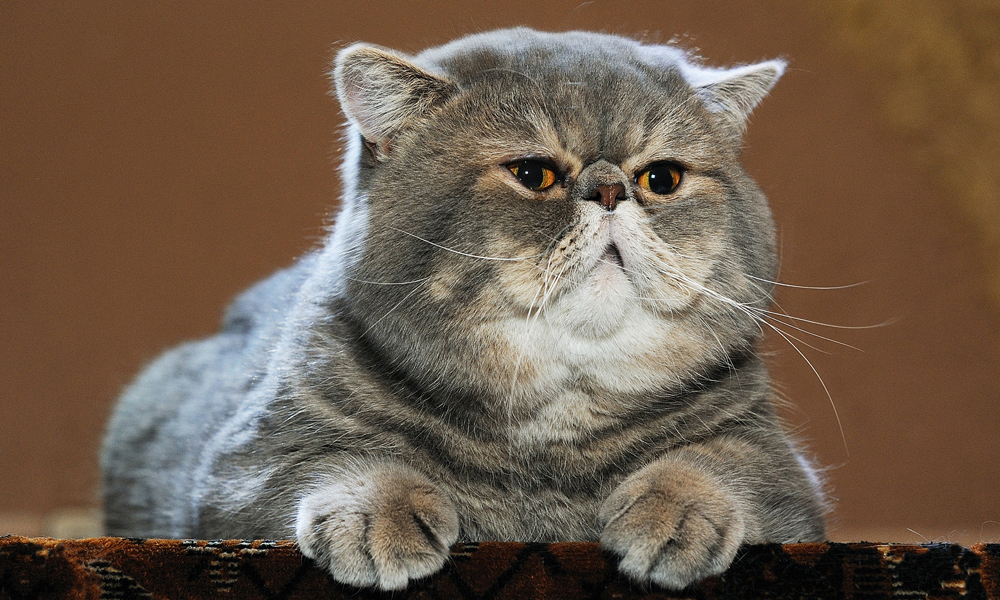Cats are beloved family members. When they live indoors where the risk of injury, infection and death are many times lower, a cat can take a special spot in your life for as many as 20 years.
At the same time, having an indoor cat means making sure they get the attention they need to live out their elder years in good health, comfort and with plenty of kitty contentment all around. Use this guide to help you get started in understanding the needs and issues that arise with mature cats, and how you as a pet parent can meet these needs.
When is a cat considered a senior?
Cats can start showing signs of advancing age as young as seven and as late as 12. You may notice that he’s hesitating to make his springing leap from the floor to a high shelf. Or your vet may point to specific markers in the bloodwork from kitty’s annual visit. Or you may notice physical changes. For instance, aging cats have decreased muscle mass, so their shoulder blades may protrude and be more defined than a younger cat. Or you may see it in their eyes. In older cats, the outline of their irises may appear jagged.
How often should senior cats visit the vet?
Once your furry friend is officially considered a cat of a certain age, your vet may recommend increasing the visits to twice a year, one to collect bloodwork that can reveal if something’s amiss with your cat, and the other for a general check-in.
By the way, it’s become pretty common for pet parents to skip their indoor cat’s annual vet visit. True, indoor cats go through their lives with less going wrong. The number of infections or injuries to treat may range from few to none, and their risk of exposure to feline immunodeficiency virus is much, much lower. But this false sense of security can catch up with your cat as he ages.
Cats are masters of disguising their injuries and ailments. Even if subtle signs for medical attention elude you, annual bloodwork can uncover serious, chronic conditions that affect the kidneys, thyroid, liver and heart. While these can cause long-term harm, many are manageable with early detection.
Having a vet’s professional eye on your pet can create a baseline for his health, and catch serious conditions early so they can be managed and treated.
[Find out more about why even indoor cats need wellness visits and what to expect.]
Top medical concerns with senior cats
Obesity
While some mature cats may experience weight loss, obesity is a problem in many older cats, especially if those appetites are still going strong. Half of cats ages 5-11 are considered overweight, and carrying extra pounds can create extra issues in older cats. For one, the extra weight puts pressure on already arthritic joints. Also, as numerous studies have found, feline obesity increases the risk of chronic and serious medical conditions.
Help kitty keep his love of food in balance to maintain a healthy weight, especially during the older years. Revisit the recommended serving size listed on the cat diet packaging, and follow them. To keep your cat from being hungry after meals, start with the portion he’s used to, and gradually scale back the “extra” until his dinner serving is where it should be.
[Need help controlling kitty’s weight? Get more information here on helping your cat eat less and exercise more.]
Kidney failure
As cats age, damage to the kidneys can manifest over several years, leading to kidney failure, which is common in older cats. Early symptoms — such as poorer coat quality, increased water intake, weight loss and bad breath — won’t necessarily signal that something is seriously wrong. That points to the importance of making it a habit to bring your older cat to the vet. Through annual bloodwork, your pet’s health provider can detect the early stages of renal failure.
Hyperthyroidism
Elderly cats are more likely to develop hyperthyroidism, which shows up in over-activity and requires medical treatment and medication to manage. A classic symptom is when the cat is eliminating more frequently. (Keep in mind, increased urination and accidents can also be symptomatic of other conditions that arise in aging cats, such as the aforementioned kidney failure and diabetes mellitus, so when you notice a change in your cat’s litter box habits, call your vet.)
Arthritis
As kitty joints become stiff and inflamed from arthritis, you’ll notice a gradual decrease in activity. They may play less, hesitate to jump up to his favorite perch or use the stairs. If your cat is already overweight, arthritis can make the issue even worse.
Dental disease
Dental diseases like gingivitis and periodontitis are common in older felines. Anywhere from 50-90% of cats older than age five end up suffering from dental issues. If your cat is avoiding food, that’s a sign that something is causing tooth pain, so schedule a vet appointment so it can be treated.
Tips for elderly cat care
In addition to making those regular vet visits, follow these tips to help your mature cat live his happiest, healthiest life.
Provide plenty of mental stimulation
Though older cats may sleep more, don’t be lulled into thinking he should be left alone at all times. The mind of a mature cat still needs something to latch on to. Do what you can to encourage him to engage with the world.
- When he’s hungry, presenting his meal in a new food puzzle gives him an incentive to work for his meal, while “exercising” his mind.
- Modify your play sessions to meet his needs. He may jump and run less than he used to, so swing the wand in smaller arcs so he can still get exercise and enjoyment from swatting and pouncing.
- Kitty’s golden years can be an enjoyable time for pet parents, especially if they’re apt to cozy up next to you. Make sure you carve out time each day for one-on-one interactions.
Provide a warm, toasty spot to rest
Older cats have an affinity for things that radiate heat, and one reason is because heat soothes their sore, inflamed arthritic joints. As older cats lose muscle tone and move around less, they become leaner versions of their younger selves and are more prone to getting chilly. Invest in a heated bed that activates when it detects the weight of your cat. It will quickly become kitty’s favorite place to hang out without the risk of burning his skin.
Provide accommodations for older cats
When your cat starts slowing down, make accommodations to keep him more comfortable.
- If arthritis is making it too painful for your cat to use his cat tree, provide a ramp so he can come and go as he pleases.
- Add another cat box. Giving kitty another place to go can reduce the number of accidents, especially if he has to walk a distance from his favorite sleeping spot.
- Add at least one water bowl per story. If joint pain is making him hesitate to climb the stairs to reach his feeding area, an extra water bowl can help your cat stay hydrated.
- Plug in extra night lights for kitty. This can help him get around safely during the nocturnal hours, especially if their spatial abilities are becoming impaired. Older cats can also suffer cognitive issues, meaning he can get confused even in familiar spaces. Extra lighting often helps.
- Account for hearing loss when you approach. If you notice your cat isn’t noticing the sound of the can opener or the rattle of the treat box, he may have experienced age-onset hearing loss. Before you interact with your cat, make sure he’s aware of your presence so you don’t startle him.
Provide a grooming assist
During grooming, aging cats can have difficulties reaching everything, especially when arthritis or extra pounds make it downright painful to twist and flex.
- Brushing your elder cat daily can keep their coat in good condition and reduce hairballs.
- During these grooming sessions, check their ears, skin and claws to see if they need help with grooming and trimming. Getting up close and personal with your pet each day makes it easier to perceive subtle changes in your cat’s physique and demeanor that require a vet’s attention.
Keep your cat hydrated
Reduced kidney function, along with the dehydration that often accompanies older-age feline ailments, can spell trouble for your cat if he’s not drinking enough water. Be attentive to your cat’s fluid intake.
- Invest in a cat fountain. The motion of the stream is captivating to cats and will tempt him to take extra sips.
- At mealtimes, add a quarter cup of water to their kibble, and mix before serving. To make it smell extra enticing, use warm water or microwave the mixture for a few seconds.
- Mix wet food with dry. Wet food can help water-averse cats stay hydrated. Most cats readily take to canned diets, because the meaty mix appeals to their feline palates. But if your cat needs time to adjust, start by adding a spoonful or two of the wet food. After a few days, start mixing them together, adding more as your cat starts taking to the change.
Feed your older cat a healthy diet
A high-quality senior diet gives your mature cat a complete source of balanced nutrition to stay in top health, inside and out. NutriSource Senior/Weight Management Cat Recipe is a lean diet that features delicious chicken meal as the top ingredient. NutriSource formulates all of their foods with their innovative Good 4 Life® supplement system that promotes heart health and keeps their gut in balance so they’re better able to fight off infections and disease. Shop for NutriSource at your local, independent pet supplier.


